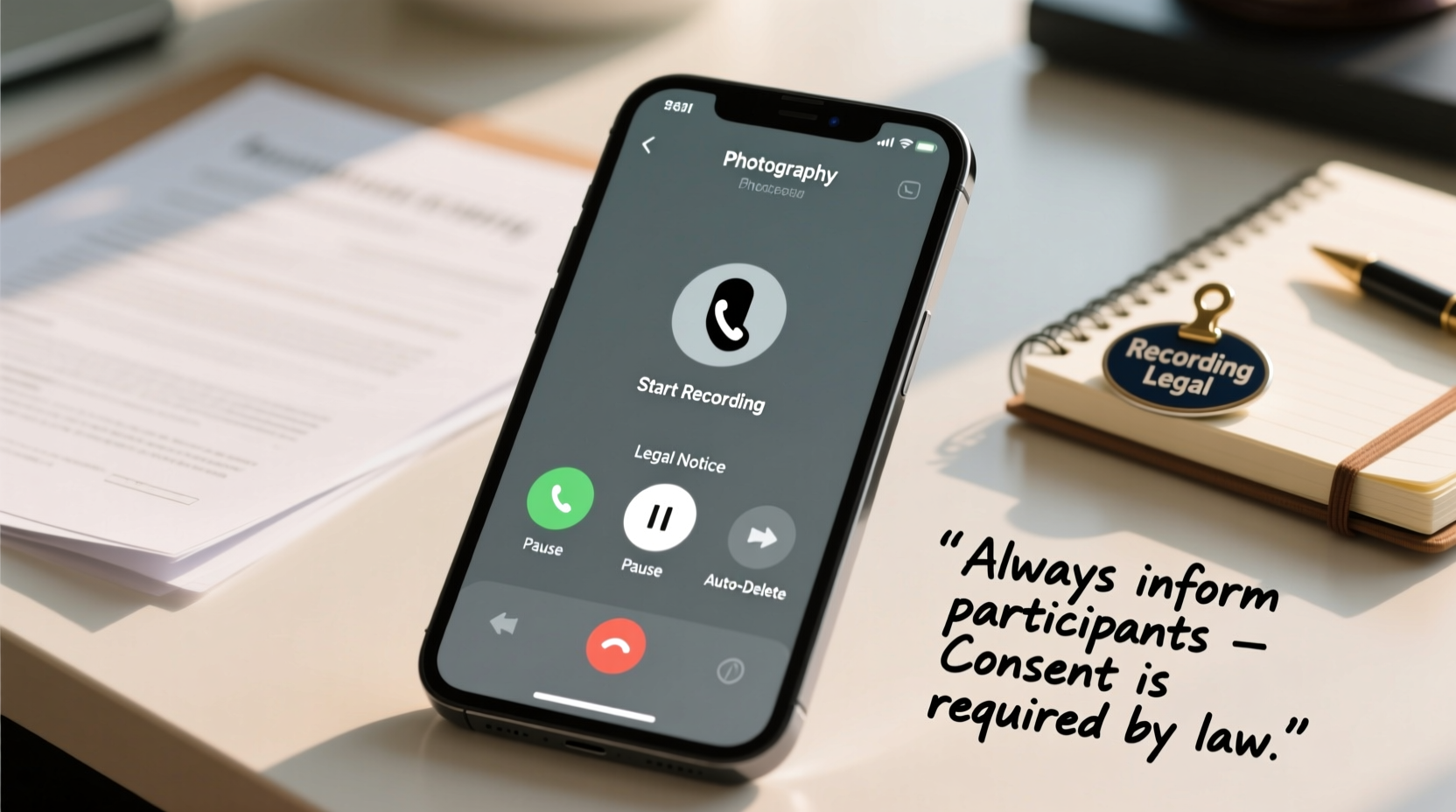Recording a phone conversation can be essential for personal documentation, business accountability, or legal protection. However, doing so without understanding the legal framework can lead to serious consequences. With mobile devices now central to communication, knowing how to record calls safely—and ethically—is more important than ever. This guide provides actionable steps, legal insights, and practical tools to help you record mobile conversations with confidence and compliance.
Understanding Legal Compliance: One-Party vs. All-Party Consent

The legality of recording a phone call hinges on consent laws, which vary significantly by jurisdiction. In the United States, federal law permits one-party consent, meaning that if you are a participant in the conversation, you may legally record it without informing the other party—as long as at least one person (you) consents.
However, 12 states—including California, Florida, Illinois, and Washington—require all-party consent. In these locations, recording without each participant’s knowledge is illegal and could result in civil penalties or criminal charges.
“Consent is not just a legal requirement—it’s an ethical responsibility. Always consider the privacy expectations of others when capturing private conversations.” — Sarah Lin, Digital Privacy Attorney
Outside the U.S., laws differ further. For example:
- In Canada, one-party consent is allowed under certain conditions.
- In the UK, recording is permitted for personal use under “subject access,” but sharing or using recordings in court requires consent.
- In Germany and France, all parties must generally consent before recording.
Step-by-Step Guide to Recording Mobile Calls Safely
Whether you're using an Android or iOS device, built-in call recording is often limited due to carrier or platform restrictions. However, third-party apps and external methods can fill the gap—if used responsibly.
- Determine your legal standing: Confirm whether your location allows one-party or requires all-party consent.
- Choose a reliable recording method: Use trusted apps or services compatible with your device.
- Notify participants (if required): In all-party consent states, clearly disclose the recording at the beginning of the call.
- Test your setup: Conduct a test call to ensure audio quality and storage functionality.
- Store recordings securely: Save files in encrypted folders or cloud storage with access controls.
- Maintain records of consent: If consent was given verbally, note the date, time, and context for future reference.
Top Tools and Apps for Effective Call Recording
While iPhones do not natively support call recording due to App Store policies, several workarounds exist. Android users have more flexibility, but should still prioritize security and data handling.
| App/Tool | Platform | Key Features | Privacy Considerations |
|---|---|---|---|
| Google Voice (U.S.) | Android/Web | Free call recording; automatic transcription | Records only incoming calls; notifies caller |
| Rev Call Recorder | iOS, Android | High-quality audio; cloud backup; HIPAA-compliant options | Requires conference call setup; clear disclosure needed |
| TapeACall Pro | iOS, Android | One-tap recording; direct export to email or Dropbox | Caller ID shows third-party number; inform participants |
| Automatic Call Recorder (Apalon) | Android | Auto-saves recordings; tags by contact | No built-in consent notification; user responsibility |
Real-World Scenario: Documenting a Customer Service Dispute
Mark, a small business owner in Texas (a one-party consent state), had been negotiating a contract renewal with a telecom provider. After multiple calls yielded conflicting information, he decided to record his next conversation to protect his interests.
He used Google Voice to place the call, enabling recording with a single click. The representative initially denied prior promises, but the recording captured a clear commitment to a discounted rate. Mark submitted the audio to the company’s dispute resolution team, which honored the original terms within 48 hours.
This case highlights how lawful recording can serve as powerful evidence in commercial interactions—especially when verbal agreements are involved.
Best Practices Checklist
To ensure your recordings are both effective and compliant, follow this checklist before every recorded call:
- ✅ Verify local recording laws (one-party vs. all-party consent)
- ✅ Use a high-quality microphone or app for clear audio
- ✅ Disclose recording if required—or when ethically appropriate
- ✅ Test audio levels and background noise beforehand
- ✅ Label recordings with date, time, and participants
- ✅ Store files securely with restricted access
- ✅ Delete recordings when no longer needed to minimize privacy risks
Frequently Asked Questions
Can I record a call on my iPhone?
Apple restricts native call recording, but third-party apps like Rev or TapeACall allow recording via conference call linking. You initiate the call through the app, which joins you and the recipient into a three-way call and records the session. Always disclose the recording, especially in all-party consent jurisdictions.
Is it legal to use a recording in court?
Yes, but only if the recording was obtained legally. Courts typically exclude evidence from illegally recorded conversations. Even in one-party consent states, judges may scrutinize how the recording was used and whether it violates privacy expectations.
What should I do if someone records me without consent?
If you believe a recording violated your rights (e.g., in an all-party consent state), consult a legal professional. You may have grounds for a civil claim. Document the incident and preserve any related communications.
Conclusion: Record Responsibly, Act Ethically
Recording mobile phone conversations can be a smart way to safeguard your interests, clarify misunderstandings, or maintain accurate records. But with this capability comes responsibility. Legal compliance is non-negotiable, and ethical considerations should guide every decision—even when the law allows discretion.
By choosing the right tools, following best practices, and respecting the privacy of others, you can record calls effectively while maintaining trust and integrity. Whether for business, personal protection, or documentation, informed and responsible recording empowers you to communicate with confidence.









 浙公网安备
33010002000092号
浙公网安备
33010002000092号 浙B2-20120091-4
浙B2-20120091-4
Comments
No comments yet. Why don't you start the discussion?